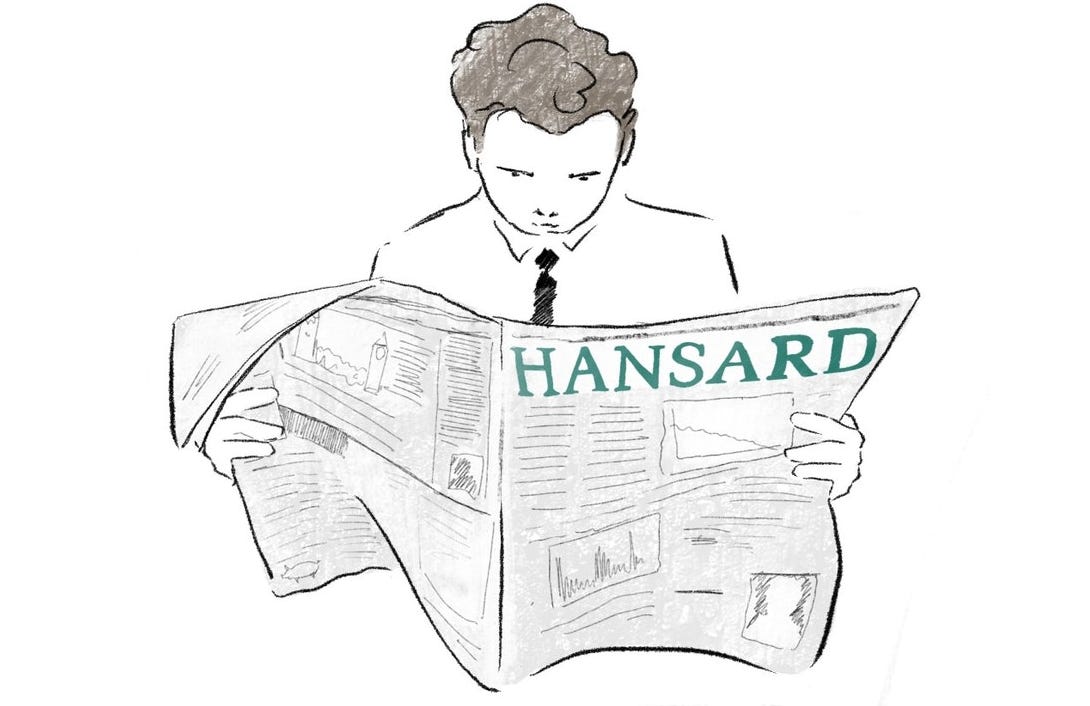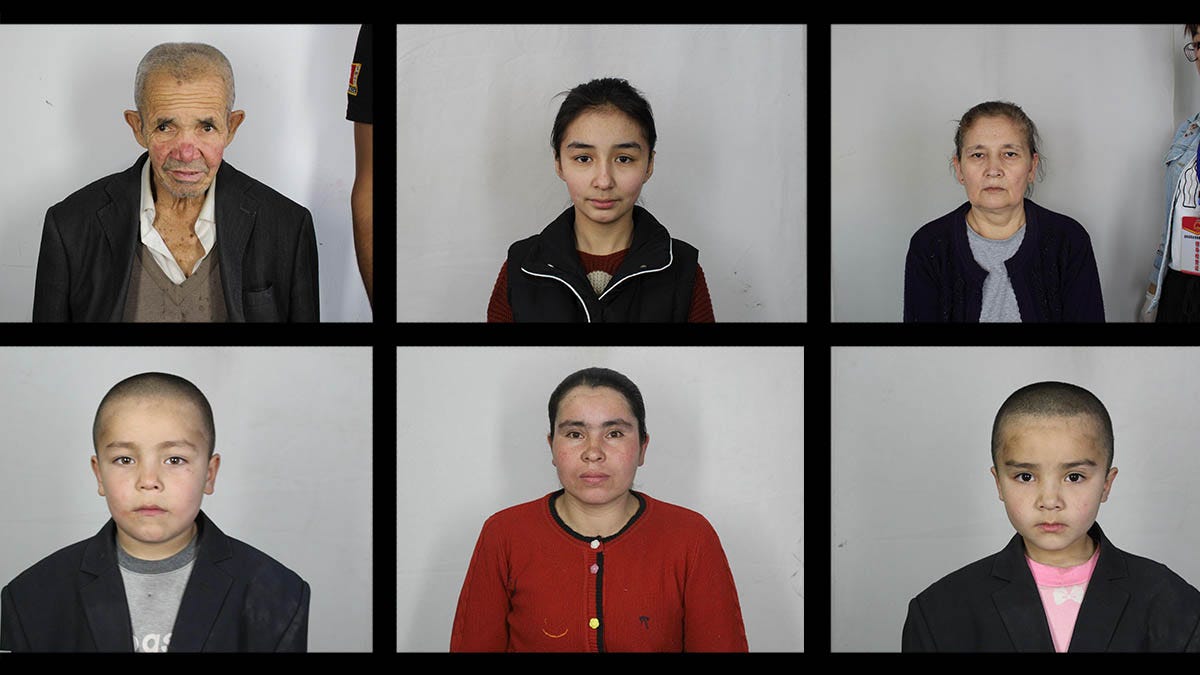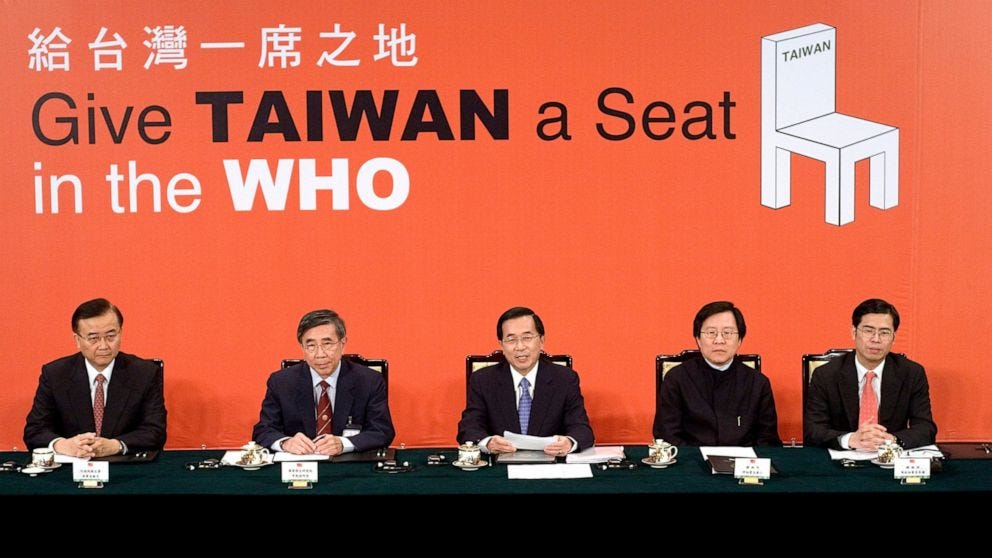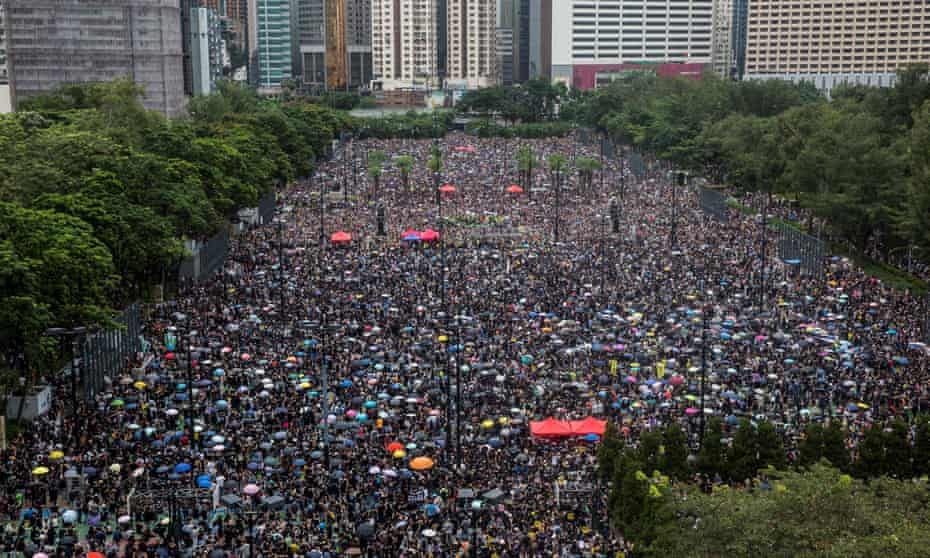Hello,
Over the last 18 months, it has increasingly been events in distant lands that have shaped the UK’s political and legislative agenda back at home. Three issues this week reveal how this works. The first was Taiwan, which was propelled back into the spotlight following President Biden’s remarks about defending the island. How the Government reacts to the hardening stance in Washington will be worth monitoring closely. The second was Xinjiang. New evidence emerged that revealed further detail on the sheer scale of arrests and human rights violations in the region - one county appears to have had 12% of the adult population in camps at one point. In lieu of Parliament getting the Government to declare a genocide is taking place, expect a renewed push on certain amendments to upcoming Bills and an effort to hold businesses accountable for their supply chains that touch the region. Third, one in eight MPs signed a letter to the Foreign Secretary this week calling for her to undertake an audit of the UK assets of Hong Kong and Chinese officials linked to human rights violations. If they are stonewalled by the Foreign Office, MPs and Peers may try and call for British companies to freeze these figures out regardless. Discussions on all these areas point to Parliament’s ongoing frustration with the Government lack of a public China strategy.
In the City, the acquisition of Newport Wafer Fab by a Chinese-linked company has officially been called in by the Government in the first public use of the National Security and Investment Act. Although the call-in of BP followed less than a day later, it means the first use of the National Security and Investment Act will forever be linked to the Chinese Communist Party. Elsewhere, there was a hefty Parliamentary debate on foreign lobbying and China’s role therein - this will continue to be a sticking point for MPs and Peers in the coming months as the Government works out how far to spread the net. And some new details emerge about a Chinese company very much in Parliament’s crosshairs right now, and a list of others that may follow.
A concluding thought. Writing in the Financial Times this week, Gideon Rachman observed that in light of the Russian invasion of Ukraine and China’s maneuverers under President Xi Jinping, “politicians and generals are back in charge - and business people, who assumed for decades that the whole world was a potential market, are disorientated.” While there is certainly much to be said about the quality of those politicians and generals in charge, Rachman’s analysis will not be new to old China hands, for whom business has always been politics. The difficulty now arises in navigating exactly which politicians and generals are worth listening to.
Welcome to ‘Beijing to Britain’ - a weekly overview of the ebbs and flows of the discussion in Westminster and the City around the UK’s relationship with China, and how it impacts politics, the private sector and society.
There will be no Briefing next week as Parliament is on Recess.
A quick look at how China is being discussed in Parliament
85 mentions of China/Chinese, 1 mention of Xi Jinping, 1 mention of Hong Kong, 2 mentions of CCP, 4 mentions of Taiwan, 2 mentions of Tibet, 22 mentions of Xinjiang
589 out of 650 MPs (90.6%) have a Twitter account.
20 MPs’ tweets containing the term ‘China/Chinese’, 0 on ‘Hong Kong’, 0 on ‘Tibet’, 1 on ‘Taiwan’
Order! Order!
Some of the more eye-catching questions and tweets from Westminster dwellers this week
Tom Tugendhat (Conservative, China Research Group) tweeted “Taiwan should attend @WHO gatherings. Pandemics are too important to play politics with and Chinese Communist Party should learn off successful places, not lock them out.”
Alicia Kearns (Conservative, China Research Group) asked “the Secretary of State for Business, Energy and Industrial Strategy, whether his Department plans to take steps to protect nationally significant infrastructure projects such as large scale solar plants in line with the decision to remove China Nuclear Power Group from its involvement in the construction of the Sizewell Nuclear Plant.”
Politics
Xinjiang, Taiwan, Reports
Atrocities
The latest Xinjiang leak
On Tuesday morning, the BBC and others revealed new details on the extent of the gross human rights abuses in Xinjiang based on another data hack. Dubbed the ‘Xinjiang Police Files’, the leak revealed 5,000 police photographs of Uyghurs taken between January and July 2018, ‘shoot-to-kill’ orders in place, and the reasons for their arrests. The story was the top trending article on the BBC throughout the day and a corresponding YouTube clip racked up hundreds of thousands of views. This marks at least the third time that significant details of human rights abuses in Xinjiang have been leaked.
It’s hard to overstate the impact these reports have on British politicians. As a reminder, the original set of leaks to the New York Times in 2019 were quoted extensively in later Parliamentary debates on genocide, human rights abuses and China’s role on the global stage, and across MPs’ social media. This is not an issue that most MPs afford those calling for nuance or context any time on, and arguably along with Hong Kong is the guiding topic that many have come to view UK-China relations through.
Many in Westminster took to Twitter to share their views.
Labour MP Gareth Thomas: “The ‘shoot to kill’ policy reportedly used by the Chinese State against the Uyghurs in #Xinjiang is sickening. Government Ministers must take further action to sanction Chinese officials involved in the the horrendous human rights abuses carried out at these internment camps.”
Conservative MP Alicia Kearns: “None of this is new or extraordinary. The genocide of the Uyghur has been taking place on an industrial scale for decades China is not being held to account The UK is still shipping in products made from Uyghur blood labour Govt still contracting firms complicit in genocide.”
SNP MP Chris Law: “"Will the UK Government finally declare that China is committing genocide against Uyghurs in Xinjiang?" With further evidence released documenting China's treatment of the Uyghurs and other minorities, we need action from the UK Government and we need it now.”
Labour MP Fleur Anderson: “Today there is new evidence of a ‘shoot to kill’ policy of Uyghur Muslims by the Chinese Government. This must end. There must be justice and this starts with declaring a Genocide.”
Conservative MP Iain Duncan Smith: “Documents provide some of the strongest evidence to date for a policy targeting almost any expression of #Uyghur identity, culture or Islamic faith - and of a chain of command running all the way up to the Chinese leader, Xi Jinping.”
Labour shadow front bencher Afzal Khan: “The ongoing genocide against Uyghur Muslims by the Chinese regime is a scar on the world’s conscience. I can feel Hawagul’s pain through her eyes. The UK Gvt can & must do more to end the plight of Uyghurs facing unimaginable horrors in detention camps”
Conservative MP Nusrat Ghani: “China Shoot to Kill Uyghur policy exposed & the sham @UN toy town visit stage managed by the CCP to white wash state orchestrated Uyghur Genocide.”
On the morning of the BBC story, the Foreign Secretary Liz Truss released a statement which noted “we remain committed to holding China to account.” Chinese Ambassador to the United Kingdom Zheng Zeguang tweeted “Such a shame for BBC to carry the fabricated story about so-called “detention camps”. Pathetic for the media, in cahoots with the notorious rumour monger, to once again spread disinformation about Xinjiang. Your smearing campaign will never obstruct China from progress!” China’s Global Times quipped that “UK politicians have repeatedly echoed rumors spread by anti-China activists and groundlessly slandered China's Xinjiang policy. What is their motive? The answer is nothing more than grandstanding and eye-catching, nothing more than diverting the public's attention and covering up the UK's disgraceful human rights record, the spokesperson noted.”
Later that day, IPAC MP and long time campaigner Nusrat Ghani secured an Urgent Question on the ‘Shoot-to-kill’ policy. It’s worth reading the entire Hansard transcript (which features calls to ban Chinese firm Hikvision several times) as it’s a textbook example of why backbenchers are disillusioned with the Government’s China strategy.
Here’s a handful of the questions the Government chose not to answer during the session:
The Government chose not to answer if it had made an assessment of just how unfettered Bachelet’s visit to Xinjiang will be. (From Labour’s Shadow Minister for Asia Catherine West)
The Government chose not to answer if it had plans to sanction any of those individuals named in the leaks. (From Labour’s Shadow Minister for Asia Catherine West)
The Government chose not to answer if it was going to use the Procurement Bill “to ensure that the equipment used to carry out the repressive surveillance detailed in the leak is no longer used in Government Departments or public bodies in the UK”, including Hikvision. (Separately from Labour’s Shadow Minister for Asia Catherine West, China Research Group’s Alicia Kearns, Labour’s Shadow Justice Minister Afzal Khan)
The Government chose not to answer if they were aware that Alena Douhan, a UN human rights monitor, was in receipt of $200,000 from China in 2021. (From IPAC Co-Chair Iain Duncan Smith)
The Government chose not to answer if the FCDO had begun “engaging in dialogue with the International Criminal Court on the feasibility of an investigation into crimes committed against the Uyghurs in Xinjiang.” (From SNP’s spokesperson Chris Law)
The Government chose not to answer if it has made progress on reforming its genocide policy yet. (From Labour’s Shadow Minister for Asia Catherine West)
BTB Note: this stemmed from a private meeting between the Prime Minister, Foreign Secretary and sanctioned MPs last month in which the PM expressed “surprise” over how the UK determines genocide, and promised to look into it.
The human rights abuses being perpetrated thousands of miles away have already seen a slew of domestic bills called for or created in the UK. The Procurement, Modern Slavery and National Security Bills can all trace parts of their genesis to Parliament’s disgust over Xinjiang and anger at the CCP.
BTB Note - we learn with interest through sources that Minister of State for Brexit Opportunities and Government Efficiency Jacob Rees-Mogg is covering the brief on the Procurement Bill. As noted in a previous edition, his new Special Adviser is an old China-focussed think tanker, who in 2020 published a piece in the Telegraph which argued the “UK and its allies need to protect a liberal international order and ultimately independent nation states themselves from China's grip.”
In the short term, the Government’s unwillingness to answer questions on the issue will incentivise backbench MPs to engage in more aggressive rhetoric, and in turn treat companies they view as being complicit on some level with even harsher scrutiny. For businesses, doing business with, or even in, China is increasingly a choice some MPs will present as ‘evil’ (as we discuss later in this Briefing).
Taiwan
Surveying the landscape
"There's clearly no health crisis to justify not including Taiwan as an observer of the WHO," the UK’s Health Secretary Sajid Javid told a gathering of WHO members on Monday. It was time for them to be “given meaningful access to all relevant technical meetings not least because of the role they have played in sharing information with the rest of the world since the very beginning of Covid-19.” His comments came amid a campaign by 13 WHO members to allow Taiwan to join as an observer of the organisation’s annual assembly. The bid was not included in the official programme, and was therefore unsuccessful. "The political and legal foundation for Taiwan’s participation in WHA ceases to exist," Chen Xu, China ambassador to the U.N. in Geneva told the assembly shortly before the decision. "This political manipulation will only be met with opposition from all parties."
Three events have forced Taiwan to become an increasingly important consideration in British foreign policy discussions. First, President Biden has repeatedly deviated from the US Government’s strategy of strategic ambiguity around defending the island. Although his administration rows back on these remarks (most recently during Secretary of State Antony Blinken’s speech), in what one high ranking MP deemed a ‘good cop bad cop’ routine, it is clear that these are more than just accidents. Second, the Russian invasion of Ukraine shook those who believed that strongman leaders, despite their nationalistic rhetoric, still used the same political calculations as the West did when it came to understanding geopolitics. In the minds of many in SW1, President Xi and Putin have similarly overarching world views and are therefore not leagues apart in their ambitions. Third, and longest running, is the erosion of liberty in Hong Kong and the crackdown against the Uyghurs in Xinjiang. The idea of this being inflicted on any level to Taiwan elicits genuine concern from many in Westminster.
So what exactly is the view on Taiwan from SW1? The Government does not recognise the island as a country, nor does it maintain formal diplomatic relations. This policy was set out during a debate in 2020: “We have no diplomatic relations with Taiwan, but a strong unofficial relationship based on dynamic commercial, educational and cultural ties. We regularly lobby in favour of Taiwan’s participation in international organisations where statehood is not a prerequisite, and we make clear our concerns about any activity that risks destabilising the cross-strait status quo. We have no plans to recognise Taiwan as a state.” Economic relations are strong - the two sides hold annual rounds of trade talks, and investment in areas such as renewable energy flows both ways.
There’s a growing number of British politicians becoming invested in the future of Taiwan, and we hear that the Foreign Affairs Committee is due to travel to the island sometime in the autumn. We noted with interest that arch-China hawk and Chair of the Defence Committee Tobias Ellwood credited both Foreign Secretary Liz Truss and Defence Secretary Ben Wallace this week for moving the Government’s China Strategy “in the right direction”. What remains unclear from a wider strategic standpoint is if this Government direction would include following Biden’s America into any conflict throughout the 2020s.
Hong Kong movements
What do you need to know?
One in eight MPs this week signed a letter to the Foreign Secretary calling for the British Government to carry out an audit of the UK assets of Chinese and Hong Kong officials linked to human rights violations. IPAC MPs Siobhain McDonagh and Iain Duncan Smith, and China Research Group co-chair Tom Tugendhat led on this campaign, which is built from research conducted by group Hong Kong Watch (our coverage of that here).
Your writer has seen a copy of the letter, which said “it cannot be right that these Hong Kong officials along with their Chinese counterparts who decry “Western interference” and openly attack the right of the UK to stand by its historic, legal, and, moral commitment to the people of Hong Kong, at the same time continue to hide their wealth in property in the UK.” It cited Truss’s Mansion House speech (our brief here) and urged her “to learn the lessons from the crisis in Ukraine.”
In an accompanying press release, Duncan Smith says “[an audit would] serve as a pathway to the UK finally introducing a Hong Kong specific Magnitsky-style sanctions list against those officials responsible for the ongoing human rights violations in the city.” McDonagh that “we must ask ourselves what it means to be complicit and whether our human rights rhetoric stands up to reality. A full audit of these assets is urgently needed.” Readers may remember that McDonagh has been critical of HSBC too.
Elsewhere, the All Party Parliamentary Group (APPG) for Hong Kong published a new report examining business practices in Hong Kong and China and the need for comprehensive ESG standards. As we notified readers last year, the conversation around Hong Kong in Parliament is increasingly taking the direction of trying to penalise companies operating in the city for slacking on their ESG standards. Proponents of this cause argue that these standards are lower in Hong Kong and China and provides 19 recommendations for investors, companies and Government. This swell of movement on ESG has not yet fully cut through to Government’s legislative agenda.
Those pushing for a return to a more realpolitik view of the UK-China relationship are unlikely to find comfort in an accompanying article by IPAC member Alistair Carmichael MP. The Chair of the APPG on Hong Kong is clear: “Companies who choose to continue conducting business in regions like Hong Kong…must be considered complicit in that evil.”
Spotted - politics
A short section of things we jotted down this week
Extracts from the diary of the last Governor of Hong Kong, Lord Patten, have begun being serialised in The Telegraph. They are set to be rather explosive.
An article about a British weapons expert “cosying up to China” has gone viral on social media, and drawn a response from Labour’s Shadow Minister for Asia.
Spotted: The UK spent £10 billion with China on 1 billion items of PPE. That amount is about the size of the UK's entire reduced budget for its overseas aid programme.
“Is British science aiding and abetting the Chinese human organ trade?” asks the Telegraph this week.
The Department for Digital, Culture, Media & Sport is launching a call for views on UK data storage and processing infrastructure, security and resilience. This takes forward the government’s commitments in the National Data Strategy and National Cyber Strategy to develop a stronger risk management framework to address the risks to UK data storage and processing infrastructure.
Foreign Secretary Liz Truss tweeted it was “disgraceful” that Security Council sanctions on North Korea's illegal missile programmes were vetoed by Russia and China.
Chair of the Defence Committee Tobias Ellwood this week told MPs that “Putin would not have invaded Ukraine if President Xi had not given his backing and support.”
The Government has published its Data Sharing Governance Framework.
The European Union, the United States, and the United Kingdom announced the creation of the Atrocity Crimes Advisory Group (ACA), a mechanism aimed at ensuring efficient coordination of their respective support to accountability efforts on the ground. Human rights campaigners on issues such as Xinjiang may want to take time to read the technical details here.








